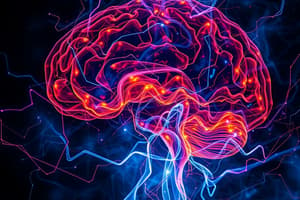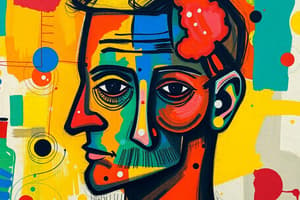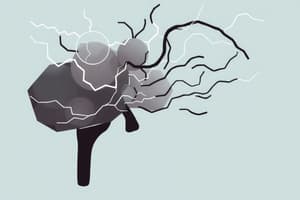Podcast
Questions and Answers
Match the following psychologists with their primary focus:
Match the following psychologists with their primary focus:
Sigmund Freud = Unconscious mind and psychosexual development B.F. Skinner = Operant conditioning and observable behavior Jean Piaget = Stages of cognitive development Albert Bandura = Social-cognitive theory and observational learning
Match the following concepts with their associated psychologist:
Match the following concepts with their associated psychologist:
Classical conditioning = Ivan Pavlov Feminine psychology = Karen Horney Collective unconscious = Carl Jung Id, ego, superego = Sigmund Freud
Match the following schools of thought with their core principle:
Match the following schools of thought with their core principle:
Behavioural = Observable behavior and conditioning Psychodynamic = Unconscious motives and internal conflicts Cognitive = Mental processes and information processing Social-Cognitive = Observation and social interactions
Match the following psychologists with their research focus:
Match the following psychologists with their research focus:
Match the following psychologists with their associated concepts
Match the following psychologists with their associated concepts
Match the following psychologists with their primary area of theoretical contribution:
Match the following psychologists with their primary area of theoretical contribution:
Match each psychological study to its primary finding:
Match each psychological study to its primary finding:
Match the following historical and scientific influence to the psychological theorist:
Match the following historical and scientific influence to the psychological theorist:
Match the experiment with the ethical issues it raised:
Match the experiment with the ethical issues it raised:
Match each experiment to the key concept or theory it helps display:
Match each experiment to the key concept or theory it helps display:
Match the ethical principle with its description:
Match the ethical principle with its description:
Match the unethical experiment with its outcome:
Match the unethical experiment with its outcome:
Match the unethical experiment with its researcher:
Match the unethical experiment with its researcher:
Match the unethical experiment with its primary focus:
Match the unethical experiment with its primary focus:
Match the unethical experiment with its significant issue:
Match the unethical experiment with its significant issue:
Match the following negative automatic thought patterns with their descriptions:
Match the following negative automatic thought patterns with their descriptions:
Match the methods of reappraisal with their descriptions:
Match the methods of reappraisal with their descriptions:
Match the concepts related to memory with their definitions:
Match the concepts related to memory with their definitions:
Match the types of negative interpretations with their definitions:
Match the types of negative interpretations with their definitions:
Match the contributions of social institutions with their significance:
Match the contributions of social institutions with their significance:
Flashcards
Operant Conditioning
Operant Conditioning
A psychological theory focusing on how observable behaviors are influenced by rewards and punishments.
Cognition
Cognition
Mental processes associated with thinking, knowing, and remembering.
Social-Cognitive Theory
Social-Cognitive Theory
A psychological theory that considers both observable behavior and mental processes, exploring how individuals learn by observing and imitating others.
Stages of Cognitive Development
Stages of Cognitive Development
Signup and view all the flashcards
Psychodynamic
Psychodynamic
Signup and view all the flashcards
Responsible Caring and Integrity of Relationships
Responsible Caring and Integrity of Relationships
Signup and view all the flashcards
Responsibility to Society
Responsibility to Society
Signup and view all the flashcards
Landis' Facial Expressions Experiment
Landis' Facial Expressions Experiment
Signup and view all the flashcards
The Monster Study
The Monster Study
Signup and view all the flashcards
Learned Helplessness Experiment
Learned Helplessness Experiment
Signup and view all the flashcards
All-or-nothing thinking
All-or-nothing thinking
Signup and view all the flashcards
Overgeneralization
Overgeneralization
Signup and view all the flashcards
Mental filter
Mental filter
Signup and view all the flashcards
Positive reframing
Positive reframing
Signup and view all the flashcards
Psychodynamic theory
Psychodynamic theory
Signup and view all the flashcards
Behavioural Psychology
Behavioural Psychology
Signup and view all the flashcards
Cognitive Psychology
Cognitive Psychology
Signup and view all the flashcards
Asch's Conformity Study
Asch's Conformity Study
Signup and view all the flashcards
Milgram Experiment
Milgram Experiment
Signup and view all the flashcards
Stanford Prison Study
Stanford Prison Study
Signup and view all the flashcards
Study Notes
Introduction to Psychology
- Psychology is the study of the mind, thoughts, and behaviours in living things.
- Psychodynamic theory is an approach to therapy focusing on resolving a patient's conflicted conscious and unconscious feelings.
- Sigmund Freud's psychoanalytic theory suggests that early childhood experiences influence behaviour.
- The unconscious mind is accessed through free association (writing words associated with another).
- The unconscious mind processes information we are unaware of.
- The conscious mind processes information we are aware of.
- The conscious mind consists of the id, ego, and superego.
- The id is instinctual thinking (pleasure principle).
- The ego is rational thinking (reality principle).
- The superego is the moral centre.
- Carl Jung believed the unconscious has personal and collective components.
- Personal unconscious is unique to individuals
- Collective unconscious is inherited from ancestors.
- Jung's work contributed to personality concepts like introversion and extraversion.
- Behaviourism focuses on observable behaviours and how experiences condition behaviours
Behaviourism
- Behaviourism studies behaviours caused by conditioning.
- Changing behaviours through reconditioning helps to treat patients.
- Classical conditioning—Ivan Pavlov—associates things through learned responses
- Operant conditioning—B.F. Skinner—how rewards/punishments influence behaviour.
Cognitive Psychology
- Cognition involves mental processes (thinking, knowing, remembering).
- Albert Bandura's cognitive revolution considers the person's background in situations.
- Individuals learn behaviour by observing others.
- Jean Piaget created Stages of Cognitive Development.
- Erik Erikson described cognitive abilities developing through adulthood.
Influential Psychological Experiments
- Asch's Conformity Study—Conformity increases with pressure.
- Kitty Genovese's Murder—Bystander Effect: presence of others reduces helping.
- Little Albert experiment—Classical conditioning and fear development.
- Stanford Prison Study—Behaviour is situational, people conform to certain roles in certain conditions.
- Stanley Milgram Experiment—Obedience to authority.
Ethical Issues in Psychology
- Ethics—Respect for the dignity of persons, responsible caring, integrity of relationships, responsibility to society.
- Unethical experiments include Little Albert, Stanford Prison, and the Stanley Milgram study.
- Landis’ Facial Expressions Experiment studied facial expressions, not ethical in methodologies.
- The Monster Study tested the impact of speech development, unethical methods used.
Additional Topics from the Text
- David Reimer—gender is a matter of socialization, not biology.
- Monkey Drug Trials—drug and alcohol abuse effects in animals.
- The Aversion Project—attempted to remove homosexuality (Unethical method).
- The Surrogate Mother Experiment—social isolation effects in monkeys.
- Negative Automatic Thought Patterns—Negative thinking patterns when approaching negative situations (common patterns detailed).
- Elizabeth Loftus—false memories.
- Methods of Reappraisal—positive reframing, evidence, extreme language
- Overview of Sociology
- Social Institution
- Social Variables
- What is Sociology?
- Origins of Sociology, Ibn Khaldun
- Development of Modern European Sociology
- What Was Happening in Society?
- Herbert Spencer
- Types of Sociology (Functionalism, Conflict Theory, Symbolic Interactionism, and Feminism)
- Structural Functionalism (MACRO)
- Sociology by approach, traditional
- Global Societal Issues—Particular to Women (Rape, lack of freedom, etc.)
- The Isms (Ableism, Ageism, Classism, Heteronormativity, Racism, Sexism, Sizeism)
Studying That Suits You
Use AI to generate personalized quizzes and flashcards to suit your learning preferences.




